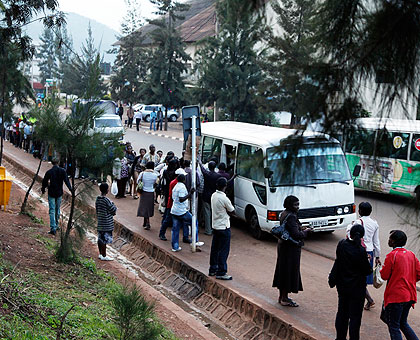A proposed code of conduct that seeks to ban public transport vehicles operating in the City of Kigali from engaging in other businesses has drawn sharp criticism from owners and operators who claim that the move is tantamount to losing control of their vehicles.


A proposed code of conduct that seeks to ban public transport vehicles operating in the City of Kigali from engaging in other businesses has drawn sharp criticism from owners and operators who claim that the move is tantamount to losing control of their vehicles.All owners and operators are supposed to sign the one year renewable code of conduct by October 31.The implementation of the new rules is spearheaded by the Rwanda Federation Transport Cooperative (RFTC) and is part of broad multi-institutional efforts designed to streamline the public transport sector in the city.The sector recently witnessed long commuter queues, especially in the city centre, during rush hours.According to Didas Bazirasa, the Operations Manager at RFTC, the cooperative has prepared the code of conduct to be signed by owners of public transport vehicles to improve the sector operations."We aim at advocating for passengers’ rights. Sometimes they are left stranded as, drivers often switch their designated routes in favour of others, which we want to avoid,” explained Bazirasa."We are signing agreements with owners of the vehicles, which will also be binding to drivers and conductors such that when a driver is caught in the wrong, he is punished. The vehicle owners normally complain and do not want to pay fines, this deal will help them in dealing with drivers,” he added.Under the arrangement, commuter taxis will neither be allowed to alter the assigned routes nor engage in any other business."Anyone signing a working contract with RFTC should ensure that their vehicle will always be a public transport vehicle all the times from 6p.m to 10p.m. for those operating in the City of Kigali,” article five of the proposed contract stipulates."…No other deals; be it weddings, temporarily working with other transport agencies, transporting any staff or students in case that person has an agreement with RFTC, except if they have written authorisation from RFTC,” reads article six of the contract.However, some owners argue that some of the rules were decided without considering their interests. "It is a big problem. I am the owner of the vehicle but I have no right over it! One can have an urgent problem or a personal issue you might want to attend to. Why should I seek permission from someone else?” Joseph Nkuyahanga, a driver on the Nyabugogo–Kimironko route wondered."There are things that RFTC decides without putting into account our rights and interests... They assigned us routes but sometimes we adjust a little depending on profitability of certain routes during certain hours,” he added.Another driver on the same route, who only identified himself as John, claimed that when they held a meeting with RFTC, they were not allowed to ask questions nor comment on the terms of the agreement."The agreement should be mutually beneficial. We are currently not against working in a streamlined way. However, it becomes tricky to operate on some of the routes while counting losses,” he added.Also, as part of the rules vehicle owners are supposed to submit full identification of their drivers and conductors and register them with RFTC.The owners, however, questioned the rational and viability of this requirement since drivers and conductors keep changing jobs at will.


